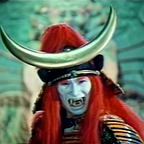“Afro Samurai: Resurrection,” Cool Looking Crap is Still Crap
Afro Samurai: Resurrection is a hyper-stylized anime film from 2008. It’s half hip-hop and half chanbara. Unfortunately, it includes the worst of both worlds. It does include some of the good stuff, but it is drowned in a sea of misogyny, racism, and stupid crap.
I could have ignored some of the macho bravado for the sake of entertainment, but it was Samuel L. Jackson’s character, Ninja Ninja, that got the nausea ball rolling. Ninja Ninja belongs to that great pantheon of minstrel-inspired abominations like Jar Jar Binks. Ninja Ninja is a sassy sidekick who delivers lines like, “I’m happy ’cause I smile all the time!” It doesn’t help that he was written by a Japanese man named Fuminori Kizaki.
While you are busy trying to cringe your way past the racism, the lead character, Afro, and his assistant, Ninja Ninja, make their way to a strip club. Once there, we are treated to a mindless pink montage of objectification. I can tolerate the big, half-exposed breasts of the villainess. It’s not the greatest thing ideologically, but as part of the anime tradition, a little bullshit can be overlooked. It’s when there is an entirely unnecessary scene dedicated to nothing more than making women’s bodies into decoration that the bullshit gets too deep.
This image contains material Medium does not allow. Click here to see uncensored article
The villainess, Sio, is voiced by Lucy Liu, and someone named Bin is voiced by Mark Hamill. The characters don’t say each other’s names much, and some of their names are just numbers, so it’s very hard to figure out who is voicing who. They got Rza and Ghost Face Killer from the Wu Tang Clan to make the soundtrack. It was fine. Some of the mixing of hip-hop and samurai culture is fun. There is a scene where a DJ plays hip-hop at a traditional Japanese festival while everyone dances around in kimonos.
The real kicker is the hero. Chanbara, like spaghetti westerns, often have morally ambiguous heroes. The lead samurai is usually haggard and world-weary, but Afro is past being haggard. He is closer to an emotionless psychopath, leaving nothing but death and suffering in his wake. Afro is not a figure of black empowerment, he is an empty parody of the bitter gunslinger merged with the transactional narcissist of late-stage capitalism. He kills a boy’s father right in front of him, and Afro just leaves the child to weep over his daddy’s corpse. Even after this, we are still meant to identify with Afro as the hard-edge symbol of cool indifference.
As is so often the case, the anime film is based on an anime television show, which is in turn based on a manga series. The original manga was written by Takashi Okazaki.
The next step after a manga becomes an anime movie is often live-action. There are two live-action shorts of Afro Samurai already out there: Afro Samurai: Flesh and Bone in 2009, and Afro Samurai Champloo in 2019. However, there is no big budget, full-length feature, and hopefully there never will be.
If you enjoyed this article you might also enjoy —
